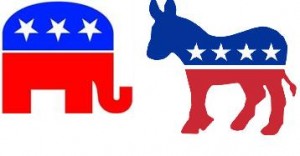This is part 1 of a 2-part article.
 In our current two-party system, independents need the two big parties.
In our current two-party system, independents need the two big parties.
There is, of course, an Independent Party, and people have differentiated members of this party from independents by using the phrase “small ‘I’ independents” to denote those who aren’t part of any party.
Few independents have any interest in joining a third party. They consider this a worse option than signing up as a Democrat or Republican.
Most independents share a frustration with both major parties, and they see partisanship itself as symptomatic of America’s problem. Independents especially dislike the political wrangling of party battles.
But let’s get one thing clear: In nearly all elections, most independents end up voting for a candidate from one of the two big parties.
There are several lessons to be learned from this.
Let’s Party!
First, independents need the parties.
Perhaps a non-party arrangement like the one envisioned by America’s founding fathers will someday offer a better system. Or maybe independents will eventually take over one of the major parties.
But in our current system, independents need the parties to be and do their best. Independents need to be able to choose between the highest caliber of candidates and policies, and the sheer numbers affect both the ability to get a message out, and the ability to attract willing candidates.
Bottom line: the parties are still providing the available options for our votes.
Second, the two-party system needs independents.
When the big parties hold a monopoly on political dialogue and innovation, centrist members of both parties congeal together a great deal and the parties often seem more alike than different.
 Throw large numbers of independents into the mix, however, and the parties are forced to energetically debate their platform and the weaknesses of their opposition’s candidates, policies and so forth.
Throw large numbers of independents into the mix, however, and the parties are forced to energetically debate their platform and the weaknesses of their opposition’s candidates, policies and so forth.
They have to articulate their message more clearly and differentiate themselves in order to garner independent votes.
Ironically, as much as independents abhor political fighting, it is by contrasting themselves with such “vulgarity” that thoughtful, idealistic and principled independents define themselves.
Not as a group, of course—but as individuals who are independent of and above the disingenuous and exploitive methods and motivations they believe typify the party loyalists.
The noisy and unproductive debate is the point to which independents are counter-point.
At the same time (and this is point number three), the strong influence of independents keeps either party from obtaining too much power for long.
Studied, serious-minded citizens who think and act independently and make their influence felt are exactly the type of citizens the American founders hoped would populate the republic.
Party loyalties too often reduce this level of independence. At their best, independents function as much-needed checks and balances on the two-party system that has become too powerful.
Party People
The independents need the parties, and the two-party system needs the independents.
But a fourth lesson might be the most important. The individual parties themselves actually need independents.
Political parties are only as strong as their collective members, and there are certain types of members that are extremely valuable to party influence.
For example, parties benefit from Traditionalist members—people who were raised with passionate loyalties to Democrats or Republicans.
Such members nearly always vote for the party and its candidates, and often they cast straight party votes without seriously considering other options. Their allegiance to the long view of Party dominance overshadows their concerns and even outright disagreements with the Party.
Politicos are a second important group of members in any party.
Politicos love politics. They watch it with as much interest and passion as dedicated sports fans follow their team. Politicos listen to party leaders, think about and memorize talking points (often unconsciously), and promote the party line. They also study lots of literature debunking the other party and pass along these arguments.
A third type found in both parties is the Intellectual. Intellectual Partyists are distinguished most by their habits of skepticism and asking questions. They consider party literature mere propaganda and instead search out and study original sources.
Intellectuals typically read opposing party sources as much or more as works from their own party.
Policy Wonks are a fourth type in any party, and they care most about specific proposals, plans and models, and enjoy studying them in detail, discovering patterns and flaws, and creating counter-proposals and solutions.
They examine, scrutinize, analyze, write and attend lots of seminars, panels and other events filled with discussion. Most of them make their living doing this in academia, media, punditry, the lecture circuit or blogosphere, or the like.






If you call yourself an independent but vote for Republicans and/or Democrats, in what sense are you independent? Unless you are supporting and voting for independent and third party candidates, you are not “independent” of anything, but co-dependent with the Democratic-Republican Party.
I tend to agree with d.eris. I understand the claim that “if you want your vote to count” you need to vote for one of the main two party candidates, but it seems like a sell-out of the independence at times. This last presidential election, neither candidate came close to representing my principles, so I wrote in another. Was it a wasted vote? I don’t think so because it was my vote. I see the party system as representative of all that is wrong with American politics and until there is found a way to check the parties, this process of electioneering and the lack of substance among politicians will continue.
“”Ignorance maketh most men go into a party, and shame keepeth them from getting out of it.” George Savile, Lord Halifax under William III and Mary of England.
I don’t think the point being made was that independents *need* to vote with the parties to make their influence felt, but rather that they tend to vote irrespective of nominal party affiliations.
I don’t see Oliver’s articles on independents as prescriptive in nature; I think he’s simply analyzing and identifying what is.
The first step of leadership is to identify the lay of the land and the core problems. As Abraham Lincoln said, “If we could first know where we are and whither we are tending, we could better judge what to do, and how to do it.”
Stephen and Rachel,
I don’t have issue with the article or the descriptive tone at all. I just wonder if these are “independents” in the two major parties, or just “ideologues”. The conservative and liberal and libertarian ideologies (and the myriad others) define themselves by their ideology instead of the party they vote with. In a parliamentary situation, these would all be different parties (I assume).
I see ideologues as being the same as party, just more fractionalized. That’s good as a decentralization of power, but it’s still doing politically what either the party powers want or what the promoters of ideology argue for.
I think that those who are independent in the way the article describes, aren’t. They are merely ideologues within a general side of the political spectrum.
True independents evaluate each issue or principle in its own light and wish to vote accordingly. Hence the frustration with the current, party-run political system.